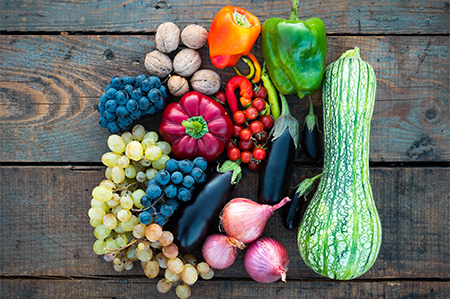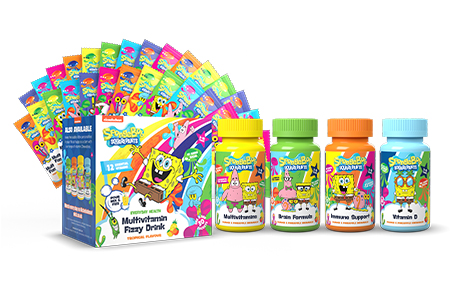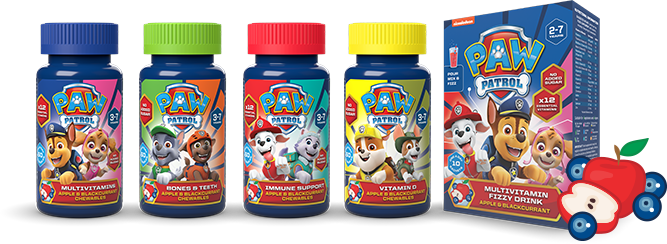As children grow and develop you want to make sure you are doing everything you can to help keep them happy, healthy and grinning as wide as SpongeBob and Patrick after a Krabby Patty! A healthy, balanced diet is essential to kids’ health, with vitamins and minerals playing an important role in their growth and development. But it can be hard to know what different vitamins do, and which we should be making sure our kids get enough of.
Here to teach us our vitamin A, C, D’s is our expert team of nutritionists, with some simple advice for parents on the best vitamins for kids!
Which vitamins are important for kids?
There are lots of vitamins that are important to kids’ health. But to make things simpler, we’ll focus on a few of the most important ones for now: Vitamin A, Vitamin C and Vitamin D.
We’ve chosen to focus on these three vitamins to start with as the Department of Health has recommended that all kids aged 6 months to 5 years are given vitamin supplements containing Vitamins A, C and D every day.
Let’s take a closer look at each of these vitamins and find out what makes them so important!
Vitamin A
Vitamin A is a key vitamin for young children, as well as babies, as it strengthens the immune system, helps with vision in dim light, and keeps skin healthy.
Vitamin A deficiency is a public health problem worldwide and can lead to serious conditions; even minor Vitamin A deficiency can contribute to kids’ being more vulnerable to infection.
There are actually two forms of Vitamin A: Preformed Vitamin A and Provitamin A. The key differences are - the foods they are found in and the way they are processed by our body.
Preformed Vitamin A is found in food such as liver, whole milk, cheese, butter and many reduced fat spreads. This form of the vitamin is known as the ‘active’ form as it can be used by the body straight away as it is.
Provitamin A can be found in plant-based foods, such as carrots, dark green leafy vegetables and orange-coloured fruits, e.g. mangoes and apricots. It is known as the ‘inactive’ form of Vitamin A that changes into an active form when eaten!
Vitamin C
Vitamin C is another essential vitamin for children. Vitamin C supports the immune system, as well as having antioxidant properties, which potentially protect cells from oxidative damage caused by free radicals. Vitamin C also contributes to normal collagen formation that supports the normal function of bones, cartilage, gums and teeth. This means it’s an important nutrient for healing.
A lack of Vitamin C can affect the immune system, while a severe Vitamin C deficiency leads to scurvy, including symptoms such as fatigue, weakness, aching joints and muscles.
Vitamin C is found in fresh fruits, especially citrus fruits and berries, green vegetables, peppers, tomatoes and potatoes (especially new potatoes).
Vitamin D
Finally, we have Vitamin D, which supports normal bones, teeth and muscle function as well as the regular function of the immune system.
Vitamin D is especially important for growing kids as deficiency during periods of bone growth in children can lead to rickets, which causes bone pain, poor growth and deformities of the skeleton. Kids with rickets are also more likely to fracture their bones.
Vitamin D deficiency and rickets in kids used to be commonplace in the UK, but health policies implemented after the Second World War made it a disease of the past. However, in recent years more cases are being reported in the UK.
Unlike vitamins A and C we actually get most of our Vitamin D from sunlight on our skin during the summer months. The strength of the sun in the UK means that the skin can only make Vitamin D between 11am and 3pm during the months of April to October. There are however some foods that contain significant amounts of Vitamin D such as, oily fish, eggs, fortified cereals, meat and fat spreads.
Summary
Vitamins A, C and D are some of the most important vitamins for kids with essential roles to play in healthy growth and development. We hope that this blog helps you understand what these vitamins do, where they’re found and how they can help your child’s nutrition.
Keep an eye out for more blogs from our knowledgeable team of nutritionists coming soon!
Now you know a bit more about vitamins, don’t forget to check out our full SpongeBob SquarePants vitamin range and select the best fit for your child.
Latest News
-
 Accreditations
AccreditationsIntroducing our friends: PETA UK
29 Nov 2021It’ll come as no surprise to say that we love animals here, whether on land or under the sea! So, it is important to us to make sure that our scrummy new range of kids’ vitamins do not harm animals in any way.
Read More -
 Health
HealthKeep your kids’ immune systems happy this winter!
20 Nov 2021The winter months bring lots of seasonal changes, from hot chocolate and cosy clothes, to not such nice things like the common cold and the flu.
Read More -
 Top Tips
Top TipsGet ready for a wave of fun in 2022, with our New Year’s resolution tips!
10 Nov 20212022 is right around the corner – and we couldn’t be more excited! With the pandemic affecting our daily lives for nearly 2 years now, 2022 offers hope for a fresh start and happy times!
Read More -
 In the press
In the pressIntroducing the shiny new SpongeBob SquarePants Vitamins website!
01 Nov 2021We’re delighted to introduce our new SpongeBob SquarePants Vitamins website, where you can find out everything you need to know about our fun-tastic range of kids’ vitamins!
Read More -
 In the press
In the pressThe SpongeBob vitamins range is now Vegan & Vegetarian accredited!
04 Aug 2021Oh buoy are we excited that our whole range of SpongeBob SquarePants kids’ vitamins is now Vegan and Vegetarian accredited by our friends at the Vegetarian Society!
Read More -
 In the press
In the pressOh Buoy! Check out the new SpongeBob SquarePants vitamins!
12 Jun 2021Looking for vitamins to boost your kids’ health? Want your child’s immune system to be as happy as a clam?
Read More -
 Health
HealthAn easy guide to kids’ vitamins
06 Apr 2021As children grow and develop you want to make sure you are doing everything you can to help keep them happy, healthy and grinning as wide as SpongeBob and Patrick after a Krabby Patty!
Read More -
 Top Tips
Top TipsTips for cooking with older kids
07 Mar 2021Cooking together with kids can be a fun way to teach them valuable skills, promote good nutrition and make long-lasting memories in the process.
Read More -
 In the press
In the pressHub News features SpongeBob SquarePants Vitamins!
01 Nov 2020The SpongeBob SquarePants Vitamins launch is featured in Hub News magazine as a full page A4 spread.
Read More -
 In the press
In the pressKam City shares news of SpongeBob SquarePants vitamins launch!
01 Nov 2020The launch of the SpongeBob SquarePants Kids’ Vitamin range has been published by Kam City, an UK-based online news company specialising in FMCG retail / manufacturing industry.
Read More




Follow Us!